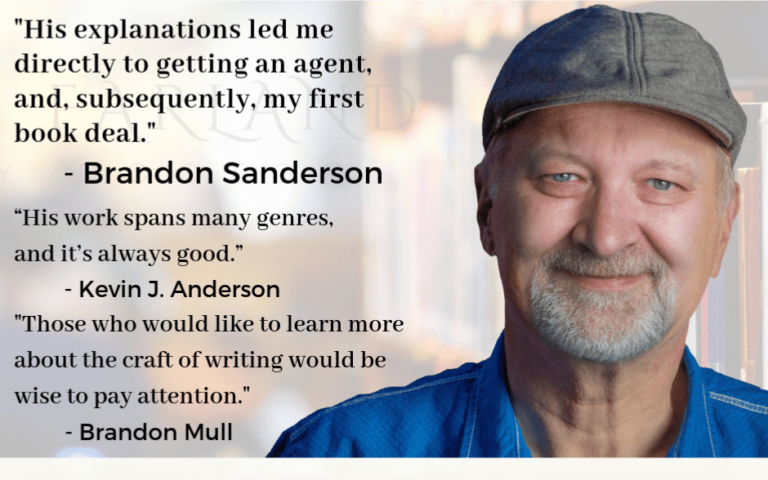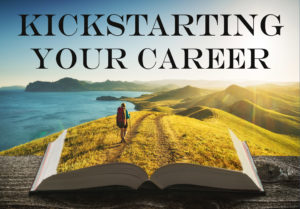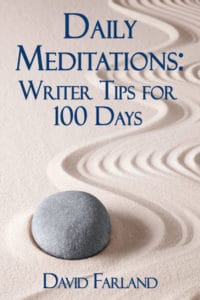At MyStoryDoctor, Master Teacher David Farland will lead you through the crucial steps to writing a compelling book, from creative concept to strong completion about how to write a book.
books on how to write a book
how to write a book with no experience
Have you ever dreamed of writing a novel? The number one reason most people fail to realize their dream is because they don’t know where to start.
books on how to write a book
how to write a book with no experience
Using the tools at MyStoryDoctor, you will learn how to farm story ideas from your everyday life. You will see how to begin your book in a way that hooks your readers and makes them want to read more; how to keep the story moving through the middle in a way that draws the reader to turn those pages faster and faster; and how to write an ending, or “denouement,” that wraps up the story in a satisfactory way and gives your reader exactly what they’re looking for.
books on how to write a book
how to write a book with no experience
Don’t want to keep your dream waiting any longer? Enroll in one of Dave’s Master Classes today and get writing!
Creative Writing Tips
What Should You Write a Book About? Often the most intimidating aspect of writing is figuring out what to write about. But it doesn’t have to be that way. Once you get started, you’ll discover that ideas are everywhere—you just need to discover them, recognize them, and be willing to give them a chance. The adage, “You never know until you try,” actually holds true with story creation. Sometimes an idea doesn’t pan out, but other times… well, let’s just say, it’s a good idea to try them all out because you never know which one will grab you and take you on a long, joyous journey.
books on how to write a book
how to write a book with no experience
How do you find that first idea? In your everyday life. On the news. In your imagination. In a conversation with a friend. On your dinner plate. In a conversation with your child. In the Bible or other books. The point is, the sources of ideas are endless; it’s only up to you to discover them. Ask the questions!
books on how to write a book
how to write a book with no experience
Here are some techniques to help you find them: Our favorite varieties of questions to ask are “what if” questions. “What if my clothing was in charge of my body weight? Would it force me to lose weight, sucking the fat out of me whether I wanted it to or not, so I could fit into them?” “What if North Korea really does have a nuclear weapon trained on the Western United States? What if they decide to use it?” “What if I knew what my dog was thinking?” “What if my best friend really was the smartest person in the world?”, and so on.
how to start to write a book
The trick is to not dismiss your idea out of hand. Even if it sounds silly or crazy, any idea is worth further consideration. A good “what if” question is one that inspires more questions, so you’re moving from one “what if” to another and another until pretty soon, you have a whole string of events spawned from one question. Chances are you’ll discover that you now have an idea worth writing!
how to start to write a book
If you’d like government assistance to write your book, GrantSpace.org recommends searching The National Assembly of State Arts Agency (NASAA) directories, your town’s arts council and your state’s art commission to find writing grants available to you. That might also help you define what you’d like to write about.
how to start to write a book
Tips on Writing a Book
How to Write a Beginning that Hooks Your Readers: Putting those first words on a page can sometimes be daunting—and no wonder, they are often the most important. How you start your story will determine whether a reader decides to read on. You want your beginning to be so powerful, the potential reader has no choice but to continue. We call this the “hook.”
how to start to write a book
Imagine a fishing hook that snags the corner of a fish’s mouth so you can reel it in. Or the hook of a staff they used in old-timey stage shows to hook and drag a poor performer off the stage. That’s exactly what a story hook is, too—a way to grab the reader’s attention, and then draw them in for more. It’s not a gimmick, though. Your hook needs to be the real deal. It has to be sincere, authentic, or no one will be snagged by it.
how to start to write a book
Think of a hook as a mini cliff-hanger, an invitation for the reader’s imagination to light up. Your first sentence should end with a hook; your first paragraph, your first page. Use every opportunity to plant a seed in your reader’s mind—a seed that quickly blossoms so the reader must find out “What happens next?”
To learn more, check out this WritingTip on Getting Started.

Novel Writing Tips
How to Write Strong Middles: A lot of attention is given to beginnings and ends, but we can’t forget the middle! The battle cry of the middle should be Escalate! Escalate! Escalate! The hooks should be plentiful. The emotion, the character development, everything should be reaching a climax of epic proportions—whether in a giant fantasy or a quiet contemporary romance. It should leave your reader sweaty and breathless, desperate for a break but not quite desperate enough to stop reading.
A good way to keep your middle moving is to work toward that climax but keep in mind that it shouldn’t be exactly as it seems. Your climax should be a “false high” or “false low”. The characters perceive it one way, perhaps your readers do, too, but the story will drive them through that climax and then in relatively quick order reveal the truth of their situation… which in turn, drives your reader into the final pages of your story.
For excellent information and personal help in writing middles, enroll in the Magnificent Middles online workshop at MyStoryDoctor.com.
Writing Lessons
How to Write a Powerful Ending: Just as in the middle of your novel there are only three rules: Escalate! Escalate! Escalate! At the end of your novel, there are only three rules: Payoff! Payoff! Payoff!
Every story should have a lasting emotional payoff that lingers with the reader. You’ve worked hard to play into your readers’ emotions through the beginning and middle. You’ve hooked them with questions that need answers, events that need to be resolved. Now, in the end, you want to give them what they’ve been waiting for.
Kisses should last longer, touches should linger. Conversations answer the burning questions of “why,” explanations are given and received. The hero is welcomed home from killing the dragon—with cups of mead and celebrations and awards.
Regardless of the genre, your hero/heroine deserves a ticker-tape parade at the end, and your reader demands it. Give them the payoff they’ve been waiting for. Read more about giving your readers this “payoff.”
There are many ways to write a book, and loads of information out there to help you along your way, but there’s only one Story-Doctor. Enroll in a workshop with David Farland today and you’ll be on the path to writing your own bestseller.
Other Resources for Writers and Book Lovers:
GoodReads – Launched in January 2007, Goodreads is the world’s largest site for readers and book recommendations. The mission of GoodReads is to assist readers in finding and sharing the books they love. Come here to not only see the books your friends are reading, but also to follow the books you’re presently reading or want to read. Meet your next favorite book!
Women’s National Book Association (WNBA) – The WNBA is a national association of women and men who work with and value books. The objectives of WNBA are both educational and charitable. Women’s National Book Association exists to support reading and to encourage the role of women in book communities.





